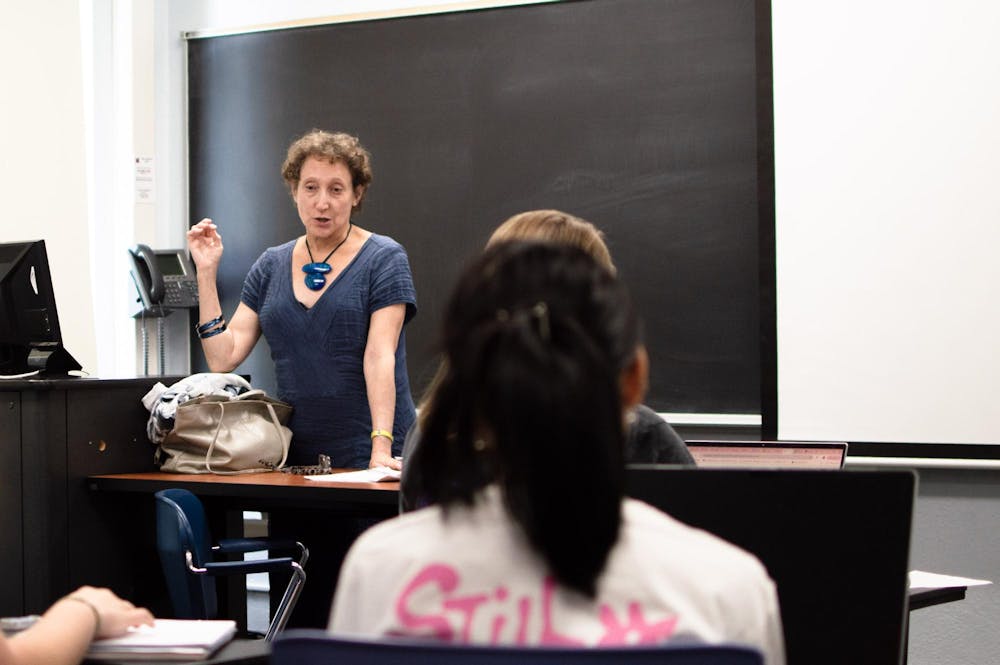Since the beginning of her academic career, Deborah Lyons has been fascinated by the classic languages, like Latin and Greek. Now, Lyons looks around at her once-flourishing department and wonders how it could have diminished so drastically.
For 21 years, Lyons has dedicated countless hours to Miami University’s classical studies program, helping students and fellow faculty members alike with their studies. However, her time at Miami will soon come to a close, and a new chapter of her life will open.
As much as Lyons loves her classes, she said she looks forward to having the extra free time that comes with retirement. She plans to finish two books she has been working on and hopes to move to Massachusetts to be near the ocean.
She’s also looking forward to spending more time with her three-legged tuxedo cat, Elvis.
“This is the first time I’ve ever had my own cat — other people’s cats would adopt me,” she said. “So, I figured I’d better get one of my own.”
As Lyons prepares to make her leave, she has reflected on the history of Miami’s classics department and realized that it doesn’t look the same as when she first arrived.
Enjoy what you're reading?
Signup for our newsletter
She said for many years, Miami has consistently diminished departments in the humanities, including classical studies. With this, Lyons has made it a point to speak up about what these changes mean for people like her in the humanities.
“Our resources have been consistently taken away, to the point where there are now three [majors] who are part of the Department of French, Italian and Classical Studies,” Lyons said. “My colleagues in French and Italian have been extremely welcoming, but it’s a sign of how diminished we are.”
She later explains that these cutbacks have caused much worry for herself and her colleagues.
“It’s just very sad to me to see this field that I invested so much in over my life be basically almost eliminated,” Lyons said. “I see that happening with a lot of humanities, and I’m really worried about where Miami is going.”
However, Lyons’ concerns about the future come from a place of endearment.
Lyons said she has had a lifelong love of the classical languages and stories. As soon as she stepped onto Wesleyan University’s campus in 1972, she knew that that’s what she wanted to study.
“I went to a school where everyone studied Latin,” Lyons said. “That’s where I got this insane idea that if you really wanted to be educated, you had to know both Latin and Greek. So, as soon as I got to college, I started Greek, and here I am all these years later.”
After graduating from Wesleyan and taking five years away from academia to learn book binding, Lyons discovered that she missed studying what she loved. This led her to get her master’s degree, and eventually, her doctorate of philosophy (Ph.D.) from Princeton University.
After graduating with her Ph.D. in 1989, Lyons worked at various universities, including Princeton, the University of Rochester, the University of Michigan and Johns Hopkins University. However, she came to Miami roughly 20 years ago and has become a beacon of light for many students ever since.
“I came here in 2004, I was very pleased, because I knew that I was joining one of the top undergraduate classics departments in the country,” Lyons said.
Throughout her time here in Oxford, Lyons has taught several courses. Some of her favorites include ancient sexualities, along with another course on religions in ancient Greece and Rome.
These classes are not only a favorite of Lyons, but also of her students.
Senior classical studies major Evelyn Rose has been taking classes with Lyons since her first year, including Greek and Roman mythology and, currently, a senior capstone course.
Rose said that being in Lyons’ classes has allowed her to learn as much as she could about classics.
“[You can tell] she loves what she does a lot, which I admire,” Rose said. “I think it’s good that you can tell that she’s not just doing it because it’s a part of her degree — she’s doing it because this is what she loves to do.”
While she said she believes that it is time for her to retire, Lyons is hesitant to leave. She hates to see her field deteriorate around her and her colleagues, and hopes that the humanities will receive the recognition it deserves.
“There are so many good things about this place,” she said. “I’ve had some wonderful experiences, wonderful students and great colleagues, but I think the university is squandering its riches.”




